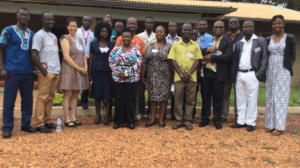Ghanaian journalists identify lack of structure in newsrooms as a challenge to performance

Journalists in the Northern, Upper East and Upper East Regions, say a major contributory factor to the pervasive under-performance of journalists in Ghana is the lack of well-structured newsrooms.
They said some newsrooms in other countries have laid out structures, especially for covering stories. They said in these countries, both editors and journalists work together to produce top quality reports.
They said in Ghana, however, most newsrooms lack these arrangements, leaving decisions like what angles to take to a story and how to get the information for the story only to journalists.
Speaking at the first day of a two-day media training workshop for journalists from the north in Tamale, participants said this situation poses a great challenge to their work as they are compelled to play all the roles in their newsrooms.
According to them, most media houses, with the exception of a few, do not even hold editorial conferences or meetings with reporters at the start and end of the day to decide, which stories to cover and what angles to take and to evaluate how this is done.
Mr Emmanuel Dogbevi, Executive Director of NewsBridge Africa and Managing Editor at Ghana Business News, who organised the workshop and facilitated a session on Press Releases and How to Pitch Stories, said there is no straitjacket rule for how newsrooms should look like, because every news organization is et up for different objectives and agenda.
He said however the basic principles that guide newsrooms should not be compromised.
He said it is important for every newsroom to have leadership; at least two senior reporters who have gone through the mill from being cub reporters, having written editorials, done feature articles, worked on commentaries and have at least some five years of reporting experience, working as editors and who could guide and groom younger reporters in their work of gathering information.
“Newsrooms or organisations in Ghana do not lack the requisite skills or people to do the work, but there is no leadership; there is not the kind of leadership that grooms reporters.
“Some newsrooms do have but I don’t think most have,” he said.
He said there should be a hierarchy and proper division of labour in the newsroom.
Mr Dogbevi said journalism has a critical role in the development of the nation.
Journalists, he noted, are not avenues for persons or groups to throw out information but are under obligation by their training and principles of the profession to process and package the information in a responsible manner for public consumption.
“This could be done by cross-checking facts, verifying and making sure you have multiple sources to a story.”
He stated that journalists on one hand have to show initiative by doing background checks on assignments and determining the possible angles, and the editor should also do checks and discuss with the journalists what angle to take and the possible questions to ask at the event.
This, he said, would also help reporters to pitch stories to their editors, as they would gain the skills in doing so.
He called for more focused training for journalists to make trainings relevant as well as redesigning the models and training strategies to equip journalists with the practical skills that would address their essential needs, especially storytelling skills.
Mr Raymond Bayor, Journalist and Communications Professional and facilitator of the broadcast (radio) journalism session at the training, said proper staffing is a fundamental difference between newsroom in Ghana and some in countries like the United States, where there is a resultant smooth work flow, with clarity on who plays what role.
He said a well-structured and properly-functioning newsroom has “incredible influence on the quality of the reporting, as the right leadership leads to mentoring”.
He urged journalists to learn from their colleagues in other jurisdictions as the principles and ethics of journalism are the same everywhere although there may be some socio-cultural differences.
Source: GNA
